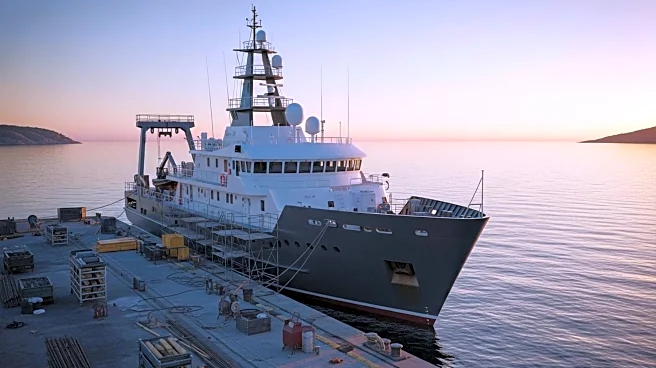What's Happening?
A significant research expedition in Uruguayan waters has been interrupted due to technical issues with the research vessel Falkor (too). The vessel, owned by the Schmidt Ocean Institute, was forced to return to the Port of Montevideo for repairs shortly after departing on August 22. The expedition, named 'Uruguay SUB 200: Journey into the Unknown,' involved 37 scientists and technicians from 18 institutions across six countries. It aimed to study marine ecology, underwater archaeology, deep-sea mapping, and marine geophysics. The malfunction occurred in the A-frame structure used for deploying and recovering heavy underwater equipment, necessitating a return to port.
Why It's Important?
The interruption of the 'Uruguay SUB 200' expedition highlights the challenges faced in deep-sea research, which relies heavily on advanced technology and equipment. The expedition was expected to provide valuable insights into marine ecology and geophysics, potentially influencing future scientific research and policy decisions regarding ocean exploration. The setback may delay the acquisition of critical data and impact the scientific community's ability to share findings through planned live broadcasts. The malfunction underscores the importance of reliable equipment in conducting successful oceanographic missions.
What's Next?
The Universidad de la República and the Schmidt Ocean Institute are likely to focus on repairing the vessel to resume the expedition as soon as possible. The scientific team remains committed to exploring the designated points of interest on the seabed, ranging from 200 to 3,500 meters deep. Once repairs are completed, the expedition may continue its mission to gather data and share experiences through live broadcasts, contributing to the broader understanding of marine environments.
Beyond the Headlines
The incident raises questions about the reliability and maintenance of research vessels used in complex oceanographic missions. It also highlights the collaborative nature of international scientific expeditions, involving multiple institutions and countries. The delay may prompt discussions on improving technological resilience and contingency planning in future expeditions.










